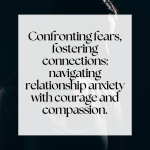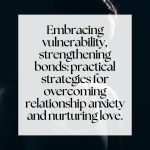In the intricate dance of love and connection, it’s not uncommon to feel the pangs of relationship anxiety creeping in from time to time. Doubts, fears, and insecurities can cast shadows on the brightest of partnerships, clouding the once-clear skies of your affections. But fret not—within these tumultuous moments lies an opportunity for growth and understanding, a chance to cultivate resilience and fortify the bonds that tether you together. And today, we will discover essential tips when dealing with relationship anxiety.

Navigating relationship anxiety demands a delicate balance of self-awareness and communication, a harmony struck through empathy and patience. In this blog, we’re delving into practicality, offering you a toolkit of strategies to help you weather the storms of doubt and uncertainty in your relationships. Let’s embark on this journey together, unraveling the knots of anxiety and unveiling the pathways to stronger, more secure connections with your partner. Moreover, feel free to take a look at these tips on how to make long-distance relationships and quotes to make your partner feel special.
Why do I get so much anxiety from relationships?

Experiencing heightened anxiety within relationships can often be attributed to a complex interplay of various factors that shape our emotional responses. Past traumas or negative experiences can linger as ghosts in the present, triggering anxiety when faced with similar situations.
These unresolved issues may create a sense of vulnerability, leading to a heightened state of alertness and unease in your current relationships. Understanding the roots of your anxiety can provide clarity and a starting point for addressing these deep-seated concerns.
Furthermore, the fear of rejection or abandonment can act as a powerful catalyst for relationship anxiety. Insecurities about self-worth or a fear of not being enough can amplify these feelings, nudging you towards a constant state of worry and doubt in your interactions with others.
30 Brutal Narcissistic Abuse Quotes That Will Hit You in the Feels
This fear of being misunderstood or rejected can fuel a cycle of anxious thoughts and behaviors, impacting the dynamics of your relationships and potentially hindering genuine connection.
Moreover, the pressure to meet societal expectations or hold onto unrealistic ideals about relationships can contribute to feelings of anxiety. Comparison to idealized portrayals of love and perfection seen in media or society can set unattainable standards, leading to self-doubt and anxiety when your experiences fail to align with these romanticized notions.
By unpacking these societal pressures and acknowledging the complexity of human connections, you can begin to navigate your relationship anxiety with greater understanding and compassion towards yourself and your partners.
6 Tips For Dealing With Relationship Anxiety
Keep an open communication

Establishing a safe space for open dialogue with your partner is paramount in nurturing a healthy relationship. Encourage vulnerability by expressing your fears and anxieties openly, allowing them to do the same.
Through honest communication, a sense of understanding and support blossoms, fortifying the bond between you both. In this sanctuary of trust and empathy, mutual growth and emotional intimacy flourish, paving the way for a deeper connection and a resilient partnership.
Self-care practices

Embracing activities that prioritize emotional well-being is a crucial aspect of self-care. By dedicating time to practices like meditation, regular exercise, or engaging in hobbies you love, you create a nurturing environment for your mental and emotional health. These activities serve as anchors, grounding you in moments of tranquility and self-reflection.
They not only strengthen your resilience but also equip you with coping mechanisms to effectively manage anxiety and stress. Prioritizing self-nurturing routines fosters a sense of inner peace, boosts emotional stability, and enhances your overall well-being.
Unveiling Emotions Through Quotes Of Hidden Feelings
Cognitive reframing

Confronting negative thought patterns entails a transformative journey of self-discovery and growth. By actively reframing your perspective, you can challenge these detrimental narratives and cultivate a more positive outlook on your relationships. Embrace self-compassion as a guiding light, allowing yourself grace and understanding in moments of self-doubt.
Encourage a shift in mindset by exploring alternative viewpoints, seeking to understand varying angles and interpretations. This practice not only empowers you to break free from limiting beliefs but also fosters empathy, resilience, and a deeper connection with others. Through intentional reflection and openness to change, you pave the way for a more harmonious and fulfilling relational landscape.
Boundaries and space

Setting clear boundaries and effectively communicating your needs are fundamental pillars in cultivating a thriving and harmonious relationship. By establishing boundaries, you define the limits of acceptable behavior and create a sense of security and mutual respect.
Communicating your needs openly and honestly ensures that both partners feel heard and understood, nurturing a foundation of trust and emotional safety. By embracing differences and celebrating individual identities, you create a dynamic and enriching connection that thrives on mutual understanding and acceptance.
Mindfulness and relaxation techniques

When it comes to dealing with relationship anxiety, incorporating mindfulness practices and relaxation techniques into your daily routine can serve as anchors of tranquility, aiding in the alleviation of stress and fostering emotional equilibrium. Whether through deep breathing exercises or mindfulness meditation, these practices offer invaluable tools to calm anxious thoughts and realign your emotional state.
By prioritizing moments of centered presence and intentional relaxation, you empower yourself to navigate life’s challenges with a sense of clarity and inner peace, ultimately promoting overall well-being and emotional balance in your daily life.
Seek support

When facing relationship anxiety, it’s essential to recognize the strength in seeking professional help or guidance from a therapist or counselor. These trained professionals offer a supportive and non-judgmental space for you to explore your concerns, gain valuable insights, and develop effective strategies for managing and overcoming relationship-related challenges.
Additionally, by reaching out for professional support, you equip yourself with the tools and resources necessary to navigate complex emotions, enhance communication skills, and foster healthier relationship dynamics.
Dealing With Relationship Anxiety Like A Pro
As you journey through the complexities of relationship anxiety, remember that it’s a path of growth and self-discovery. By implementing these practical tips, you’ve equipped yourself with valuable tools to navigate the challenges with resilience and grace. So, keep fostering open communication, prioritizing self-care, and reframing your mindset to cultivate healthier, more fulfilling relationships. You have the strength within you to overcome anxiety’s hurdles, shaping a future filled with understanding, trust, and deeper connections.
Dealing with relationship anxiety is challenging, but rest assured that you can do it as long as you remain consistent. So if you enjoyed going over these tips, make sure to check out other topics that may resonate with your journey:
- 20 Quotes About Disrespectful Partners And Toxic Relationships
- 9 Signs of Manipulation in a Relationship Not To Be Ignored
- 20 Quotes On Relationship Struggles To Improve Your Partnership
- Resolving Relationship Troubles: What Does It Mean To Be Clingy?











Leave a Reply